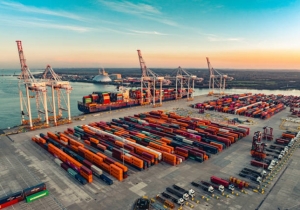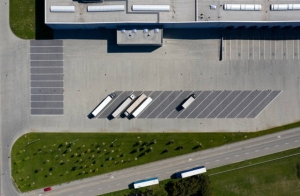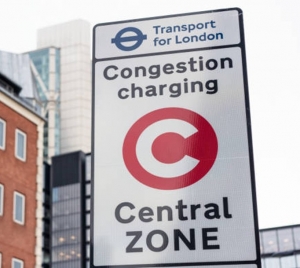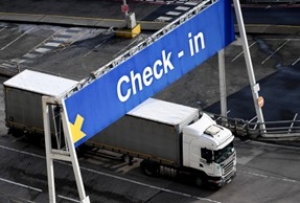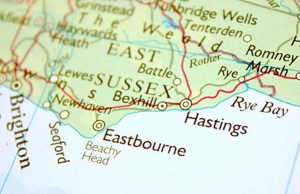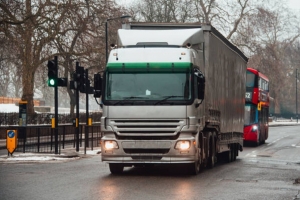Test Owner
Logistics Sector Urged to Be Recognised as Key Pillar of UK Economy
The UK’s logistics industry now contributes £170 billion annually to the economy and employs over 8% of the national workforce, according to new figures published in The Logistics Report 2025. Launched at Logistics UK’s first-ever annual conference in London, the report calls on the government to acknowledge the strategic importance of logistics in driving national growth.
Phil Roe, President of Logistics UK, highlighted that logistics is far more than a background function - it’s a core component of economic performance. He urged policymakers to position logistics as a priority within the UK's Industrial Strategy, noting its foundational role in enabling trade, supporting businesses, and sustaining supply chains.
The report combines official statistics with insights from industry professionals and survey responses from over 500 logistics firms. It reveals a dip in overall business confidence, attributed to ongoing economic pressures. However, firms continue to invest cautiously, particularly in new vehicle technology and sustainable fleet management, demonstrating their commitment to decarbonisation.
Despite efforts to modernise, the sector faces ongoing recruitment challenges. Larger firms are turning to automation and AI to fill gaps, but concerns remain about the need for a steady pipeline of skilled workers. As global trade agreements advance, experts stress that a resilient logistics network is vital to realising the full benefits of future trade deals.
Spending Review Confirms £15bn for Regional Transport as Labour Backs Growth Outside London
Following the government’s latest spending review, Chancellor Rachel Reeves has confirmed a £15.6bn investment package aimed at upgrading transport infrastructure outside London. The funding forms part of a broader £113bn capital programme designed to drive long-term economic growth through improvements in transport, housing, and energy.
The review outlined major allocations for regional transport, including £2.5bn for Greater Manchester, £2.4bn for the West Midlands, and £2.1bn to kick-start West Yorkshire’s mass transit system. South Yorkshire secured £1.5bn to modernise its tram network, and the East Midlands was awarded £2bn to begin designing a new transport link between Derby and Nottingham. Many of these projects had been previously announced but never funded under the Conservatives.
Reeves positioned the spending as a deliberate move away from centralisation, confirming a change to Treasury rules to prioritise projects that enhance productivity in regions often overlooked. She stressed that the review marks a “step change” in how investment is assessed and allocated, giving every region a “fair hearing”.
Despite concerns around tightening departmental budgets, Labour insists this capital package reflects its commitment to rebuilding Britain with fairness at its core - placing infrastructure and regional opportunity at the heart of its economic strategy.
Poland to Develop Europe’s Largest Logistics Hub in Sławków
Poland has announced plans to create the largest transshipment logistics hub in Europe, with major investment going into the expansion of the Euroterminal in Sławków, located in the Silesian Voivodeship. Prime Minister Donald Tusk confirmed that the state, alongside its partners, will invest around €1 billion to significantly upgrade the terminal's infrastructure and nearly double its current capacity.
Speaking during a visit to the site, Tusk said the project was not about breaking records but about seizing a strategic opportunity for Poland. He underlined the importance of state control over such a key asset, describing the development as a “golden opportunity” for the country’s economic and logistical future.
A key motivation behind the expansion is Poland’s ambition to play a central role in the future reconstruction of Ukraine. Tusk said Poland is keen to both support Ukraine and ensure it gains from the economic benefits that will follow. He highlighted the need to avoid repeating past mistakes, such as being excluded from post-conflict rebuilding efforts in other regions.
Strategically located at the intersection of broad and standard gauge rail lines, the Sławków terminal is already a key hub for freight moving between Asia and Western Europe. Once complete, its capacity will increase from 285,000 to over 500,000 TEU annually.
TfL Proposes £18 Congestion Charge to Tackle Central London Traffic
Transport for London (TfL) has put forward plans to increase the Congestion Charge to £18 a day from 2 January 2025 - a 20% rise from the current £15. This would be the first increase since 2020, when the charge went up from £11.50. The fee applies to vehicles entering central London between 7am and 6pm on weekdays and from 12pm to 6pm at weekends.
Under the new proposal, motorists would pay £18 if the charge is paid on the day of travel or in advance, or £21 if paid by midnight on the third day. Drivers failing to pay within 48 hours would be fined £180, or £90 if settled within 14 days. TfL also plans to link future increases to inflation and public transport fare changes.
Electric vehicles, which were previously exempt, will begin paying the charge from January, though those registered with Auto Pay will receive a 25% discount. Vans, HGVs, and other large vehicles will benefit from a 50% discount. From March 2030, these discounts will reduce further to 12.5% and 25% respectively. TfL also plans to simplify how electric vehicle discounts are applied by using DVLA data automatically.
The Federation of Small Businesses has criticised the rise, calling it a harsh blow for firms already facing financial pressures. Meanwhile, environmental groups have welcomed the move, saying it reinforces London’s commitment to clean air and sustainable transport. A public consultation is open until 4 August.
Transport Sector Pushes for Easing EU Travel Limits Ahead of EES Rollout
Concerns are rising within the UK transport and touring industries over the looming enforcement of EU travel restrictions. The Entry/Exit System (EES), expected to launch in November, will enforce the 90/180 rule - limiting stays in the Schengen Area to 90 days within any 180-day period. This has major implications for British hauliers, coach operators, and touring crews supporting UK performers across Europe.
Unlike EU artists entering the UK under a single immigration framework, UK performers must navigate varying entry rules across EU member states. The British government is working with industry voices to push for more flexible arrangements, aiming to make travel smoother for creative professionals and their support teams. These discussions are expected to feature in upcoming UK-EU talks, with calls for visa-free movement and streamlined customs processes.
Although some EU countries have shown hesitation towards the UK’s proposals, there is interest in reaching a broader agreement, particularly around youth mobility between the UK and EU. This has encouraged hopes of a tailored exemption or visa scheme to avoid disrupting international tours.
Industry leaders are calling for solutions that will maintain the UK’s strong touring presence in Europe and protect the livelihoods of those working behind the scenes in transport and logistics.
AI Adoption Surges in Logistics, Boosting Productivity and Morale
Logistics professionals are embracing artificial intelligence at a rapid pace, with a recent study revealing that 62% of information-handling staff in the sector are already using it—and nearly all report positive results. According to research from The Access Group, 97% of logistics workers using AI say it has improved their working life.
Although the logistics industry trails the tech sector in AI uptake (74%), it far outpaces sectors like not-for-profit and health and social care, where adoption is below 30%. Within logistics, employees highlighted reduced workloads, improved focus, and increased productivity as the main benefits. Better communication and enhanced customer service also ranked highly.
ChatGPT emerged as the most widely used AI tool, with more than half of respondents relying on it. Many users said it helped ease workplace stress. However, concerns remain - particularly around the risk of job losses (51%) and data privacy (46%).
Industry leaders say AI offers a transformative opportunity. Jarrod Adam of Unleashed noted that AI can help small and mid-sized logistics firms overcome skills shortages and cut costs. Meanwhile, Access Group’s Marko Perisic stressed the importance of proper training and secure platforms. With the right approach, AI can foster innovation, efficiency, and safer data handling across the logistics workforce.
Calls to Protect Historic Bexhill High Street from Heavy Goods Vehicles
East Sussex County Council is set to review a petition urging stricter enforcement of vehicle weight limits on Bexhill’s High Street. Campaigners want large vehicles, particularly HGVs, banned from the route, which currently carries a 7.5-tonne restriction that residents say is frequently ignored.
More than 500 people have signed the petition, raising concerns that oversized vehicles are damaging the road’s heritage buildings - some of which are centuries old. Lead campaigner Sandra Bandirali said urgent action is needed to preserve the street’s historic character before irreversible damage is done.
Council officers have recommended that the issue be fully assessed but warn that any measures to tackle the problem may not be implemented until later in the year. Their report highlights several obstacles, including the need to maintain access for emergency services and legitimate deliveries.
Proposals put forward by residents include redesigning the street layout to physically prevent large vehicles from using it, and rerouting buses. However, officers have raised concerns about changing bus routes, warning it could negatively impact passengers, especially those needing access to Bexhill Hospital. Meanwhile, enforcement of the existing weight limit remains a concern, with Sussex Police now asked to look into the issue further.
HGV Drivers Urged to Act as London Safety Rules Tighten
HGV drivers operating in London are being urged to ensure their vehicles meet the latest safety standards or risk receiving fines of up to £550. The new rules form part of an update to the Direct Vision Standard, aimed at reducing road danger across the capital, particularly for pedestrians and cyclists.
To comply, operators must fit a Progressive Safe System (PSS) to their vehicles and apply for an updated safety permit from Transport for London (TfL). This enhanced safety kit includes features such as sensors, camera systems, and audible alerts to improve visibility and awareness for drivers of heavy goods vehicles.
TfL had previously offered a temporary grace period to give operators more time to carry out the necessary upgrades, but this is coming to an end. Once enforcement begins, any HGV travelling through London without the required equipment and valid permit could face a fixed penalty or fine issued directly to the operator.
Authorities are encouraging all logistics firms and drivers to act now, ensuring their vehicles are properly fitted and fully compliant. These measures are part of broader efforts to improve road safety in London and reduce the risk of collisions involving larger vehicles in urban areas.
InPost Becomes UK’s Third Largest Delivery Firm Following Yodel Takeover
Parcel locker provider InPost has acquired courier company Yodel in a £106 million deal, propelling the business into the top three UK logistics providers. With over 9,000 collection lockers across the country, InPost will now expand its reach through Yodel’s door-to-door network, increasing its share of the independent delivery market from 2% to 8%.
The acquisition allows InPost to combine its automated parcel machine (APM) network with a full courier service, creating a hybrid offering that serves both out-of-home and doorstep delivery needs. InPost’s CEO and founder, Rafał Brzoska, described the deal as “transformational”, saying it accelerates the company’s UK expansion plans by five years.
The takeover sees InPost secure a 95.5% stake in Yodel’s parent company, Judge Logistics Ltd, by converting £106 million in loan notes into equity. PayPoint, known for its bill payment services in local shops, retains the remaining 4.5% stake. The acquisition builds on a partnership launched in late 2024, when Yodel began providing last-mile delivery from lockers to homes.
With this deal, InPost now handles more than 300 million parcels annually and partners with over 500 e-commerce businesses in the UK. Brzoska says the company is ready to reshape delivery in Britain, as it has already done in several European markets.
Unmarked Lorry Helps Police Spot Thousands of Dangerous Drivers
Surrey Police have hailed an unmarked HGV cab as a “golden ticket” in their efforts to catch reckless drivers, particularly those using mobile phones behind the wheel. The initiative, known as Operation Tramline, has been running nationwide for a decade, allowing officers a high vantage point to monitor behaviour inside vehicles.
Sgt Dan Pascoe, who has led the operation for Surrey and Sussex since 2015, said the initiative is making a difference, with fewer offences being detected in recent years. “The truck gives us a unique and valuable perspective,” he explained. According to National Highways, police forces have used the cab for more than 13,000 hours since the scheme began.
The top offences caught through the operation over the years include failing to wear a seatbelt, recorded 14,861 times, and mobile phone use at the wheel, with 13,553 incidents. In one case, a driver claimed they had to call their new partner because their song had come on the radio. Last month alone, three drivers in Surrey were seen using their phones with no hands on the wheel.
Sussex Police Chief Constable Jo Shiner said: “Driving while distracted is not only illegal, it’s extremely dangerous and puts countless lives at risk. The success of Operation Tramline shows just how vital this tool is for road safety.”


